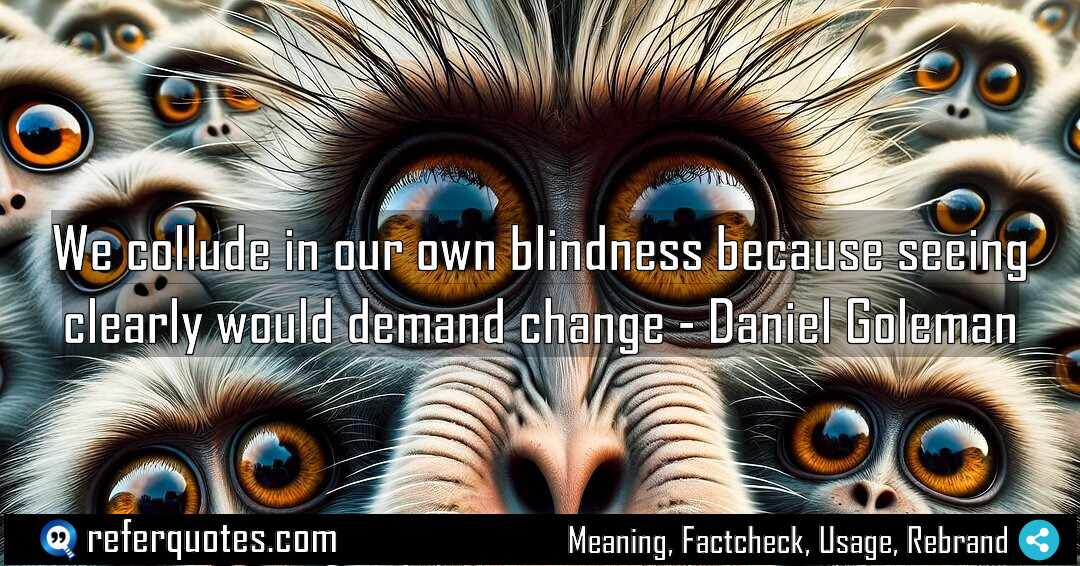You know, that idea “We collude in our own blindness because seeing clearly would demand change” hits so hard because it’s everywhere. It’s the uncomfortable truth we all live with. Once you see this pattern, you can’t unsee it.
Share Image Quote:Table of Contents
Meaning
At its core, this quote means we are active, willing participants in our own ignorance. We choose not to see the truth because facing it would force us to act, to step out of our comfort zone, and that’s a scary prospect.
Explanation
Okay, let’s break this down. “We collude” – that’s the kicker. It’s not a passive mistake. It’s a silent agreement we make with ourselves. We actively ignore the red flags in a relationship, the unsustainable pace at work, the health symptoms we brush off. Why? Because if we admitted the truth, the entire house of cards might fall. We’d have to have a difficult conversation, look for a new job, change our lifestyle. The cost of action feels higher than the cost of staying blind. It’s a brilliant, almost brutal, way of saying we’d rather be comfortable and wrong than uncomfortable and right. It’s a defense mechanism, and a highly effective one.
Quote Summary
| Context | Attributes |
|---|---|
| Original Language | English (3668) |
| Category | Personal Development (697) |
| Topics | change (101), fear (92), honesty (27) |
| Literary Style | aphoristic (181) |
| Emotion / Mood | introspective (55) |
| Overall Quote Score | 81 (258) |
Origin & Factcheck
This gem comes straight from Daniel Goleman’s 1985 book, Vital Lies, Simple Truths: The Psychology of Self-Deception. This was years before he became a household name with Emotional Intelligence. It’s a deep dive into the psychology behind why we lie to ourselves, and it’s firmly rooted in his work as a psychologist and science journalist for the New York Times. You won’t find it mistakenly attributed to other self-help gurus; this is pure Goleman.
Attribution Summary
| Context | Attributes |
|---|---|
| Author | Daniel Goleman (125) |
| Source Type | Book (4032) |
| Source/Book Name | Vital Lies, Simple Truths: The Psychology of Self-Deception (61) |
| Origin Timeperiod | Modern (530) |
| Original Language | English (3668) |
| Authenticity | Verified (4032) |
Author Bio
Daniel Goleman is a psychologist and bestselling author whose journalism at The New York Times brought brain and behavior science to a wide audience. He earned a BA from Amherst and a PhD in psychology from Harvard, and studied in India on a Harvard fellowship. Goleman’s research and writing helped mainstream emotional intelligence, leadership competencies, attention, and contemplative science. He co-founded CASEL and a leading research consortium on EI at work. The Daniel Goleman book list includes Emotional Intelligence, Working with Emotional Intelligence, Primal Leadership, Social Intelligence, Focus, and Altered Traits.
| Official Website
Where is this quotation located?
| Quotation | We collude in our own blindness because seeing clearly would demand change |
| Book Details | Publication Year: 1985; ISBN: 9780743240156; Last edition: 1996 Harper Perennial; Number of pages: 288. |
| Where is it? | Approximate page from 1996 edition, Chapter 3: The Uses of Illusion |
